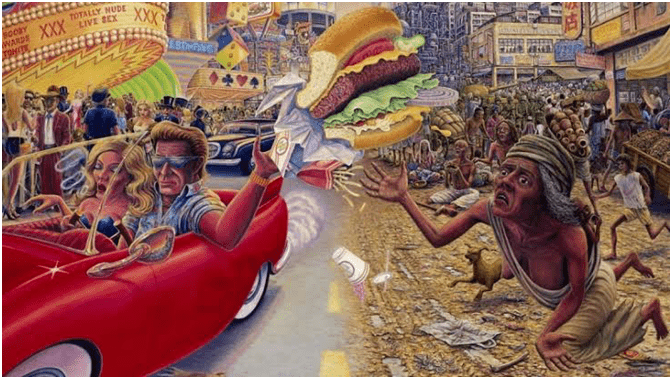Oxfam on Monday released a report stating that the world’s richest 2,153 people controlled more money than the poorest 4.6 billion combined altogether in 2019, while unpaid or underpaid work by women and girls adds three times more to the global economy each year than the technology industry. This is an example of unequal distribution of wealth in the hands of few, leaving the ROW to suffer and struggle in poverty, unemployment and hunger.
Oxfam is a confederation of 19 independent charitable organizations focusing on the alleviation of global poverty, founded in 1942 and led by Oxfam International. It is a major nonprofit group with an extensive collection of operations. Winnie Byanyima has been the executive director of Oxfam International since 2013.
The Nairobi-headquartered charity said in a report released ahead of the annual World Economic Forum of political and business leaders in Davos, Switzerland, that women around the world work 12.5 billion hours combined each day without pay or recognition. Unequal pay for work also is a major factor contributing to world poverty.
The available long-run evidence shows that in the past, only a small elite enjoyed living conditions that would not be described as ‘extreme poverty’ today. But with the onset of industrialization and rising productivity, the share of people living in extreme poverty started to decrease. Accordingly, the share of people in extreme poverty has decreased continuously over the course of the last two centuries. This is surely one of the most remarkable achievements of humankind.
There are problems within countries as well as among countries. Just as the rich exploit the poor in their own countries — there are an estimated 50 million poor in the US despite its GDP of $17 trillion — there are also gross inequalities between countries. Again these relate to unfair trade practices.
In its “Time To Care” report, Oxfam said it estimated that unpaid care work by women added at least $10.8 trillion a year in value to the world economy — three times more than the tech industry.
“It is important for us to underscore that the hidden engine of the economy that we see is really the unpaid care work of women. And that needs to change,” Amitabh Behar, CEO of Oxfam India, said in an interview.
The gap is widening each year and it’s getting harder for the economic experts to find a way to bridge this gap. Poverty is a vicious circle and coming out of it is impossible without population control and constant unemployment persisting worldwide.
It is important to emphasize that the International Poverty Line is extremely low. Indeed, ‘extreme poverty’ is an adequate term for those living under this low threshold. Focusing on extreme poverty is important precisely because it captures those most in need. However, it is also important to point out that living conditions well above the International Poverty Line can still be characterized by poverty and hardship.

To highlight the level of inequality in the global economy, Behar cited the case of a woman called Buchu Devi in India who spends 16 to 17 hours a day doing work like fetching water after trekking 3km, cooking, preparing her children for school and working in a poorly paid job. “And on the one hand you see the billionaires who are all assembling at Davos with their personal planes, personal jets, super rich lifestyles,” he said.
“This Buchu Devi is not one person. Anyone in India encounter these women on a daily basis, and this is the story across the world. We need to change this, and certainly end this billionaire boom.”
Behar said that to remedy this, governments should make sure above all that the rich pay their taxes, which should then be used to pay for amenities such as clean water, healthcare and better quality schools.
“If you just look around the world, more than 30 countries are seeing protests. People are on the streets and what are they saying? – That they are not to accept this inequality, they are not going to live with these kind of conditions,” he said.
Global poverty is one of the very worst problems that the world faces today. The poorest in the world are often hungry, have much less access to education, regularly have no light at all, and suffer from much poorer health. To make progress against poverty is therefore one of the most urgent global goals.

